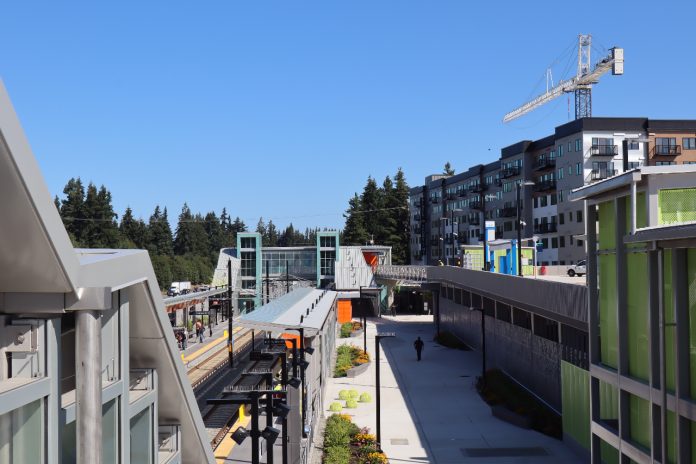
The Shoreline City Council this week approved a major update to its Comprehensive Plan that sets the stage for a substantial overhaul of the land use code in Shoreline, with additional housing density and previously banned commercial uses on track to be allowed across the entire city. The changes go well beyond the minimum needed to keep the city in compliance with state law, and include legalizing fourplexes in areas within a half-mile of transit and the removal of mandates to build off-street parking stalls citywide.
Building success in starting to fully develop the areas directly around its two Link light rail stations along I-5, which opened at NE 148th Street and 185th Street earlier this year, Shoreline is expecting to make room for over 13,000 new households over the next two decades. Rather than simply accommodate that growth along I-5 and near Aurora Avenue, the newly adopted Comprehensive Plan is set to increase opportunities for growth in neighborhoods across the city, including both denser housing and the elements of more walkable neighborhoods.
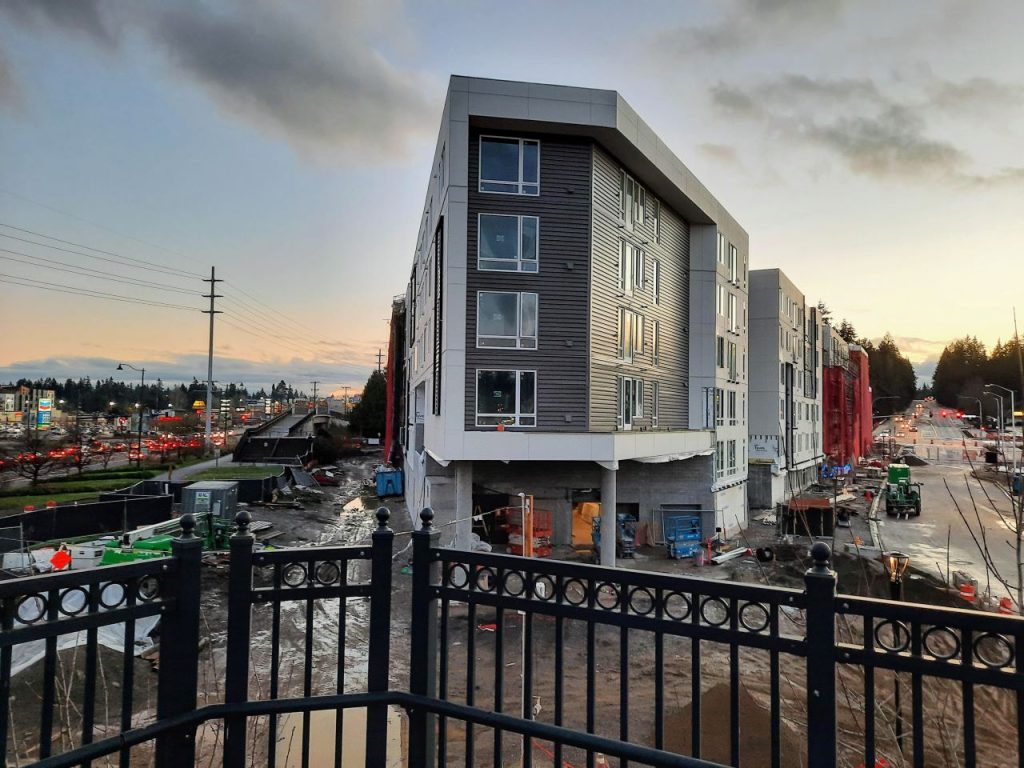
Under 2023’s House Bill 1110, Shoreline is required to allow at least four units on all residential lots within a quarter mile of those light rail stations and stops along King County Metro’s RapidRide E line. Instead, the Shoreline Council extended that to a half-mile radius, and also within a quarter mile of the city’s existing commercial centers like Richmond Beach and Ridgecrest. The policy represents a significant change from earlier this year, when numerous councilmembers expressed concerns about going further than the state mandates, and a preference to keep concentrating development within the light rail station areas.
Eliminating parking mandates to spur homebuilding
Going above and beyond the recommendations of Shoreline’s Planning Commission, the council also voted 6-1 Monday to add language around fully eliminating mandates to include a certain amount of off-street parking stalls in all new development, a move that follows in the footsteps of major US cities like Portland, San Francisco and Austin, an increasing number of Washington cities, including Spokane and Port Townsend.
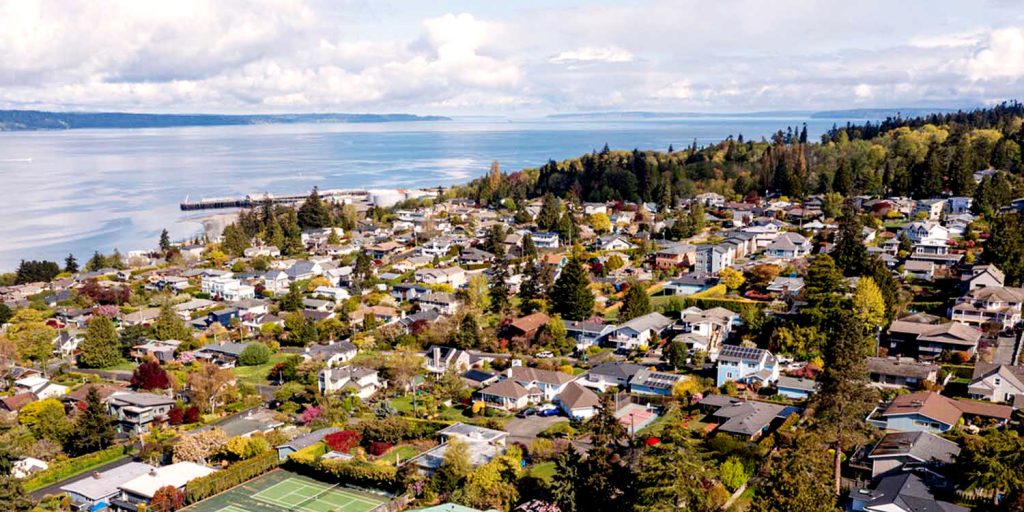
Spearheading the move to drop parking mandates has been Mayor Chris Roberts, who pointed to the conflicting requirements now existing in state law around where parking can and can’t be required.
“If you add in all the frequent transit, the number of places where parking is required is going to be relatively small,” Roberts said earlier this month. “It’s almost easier in my mind to say citywide, we don’t have a parking requirement.”
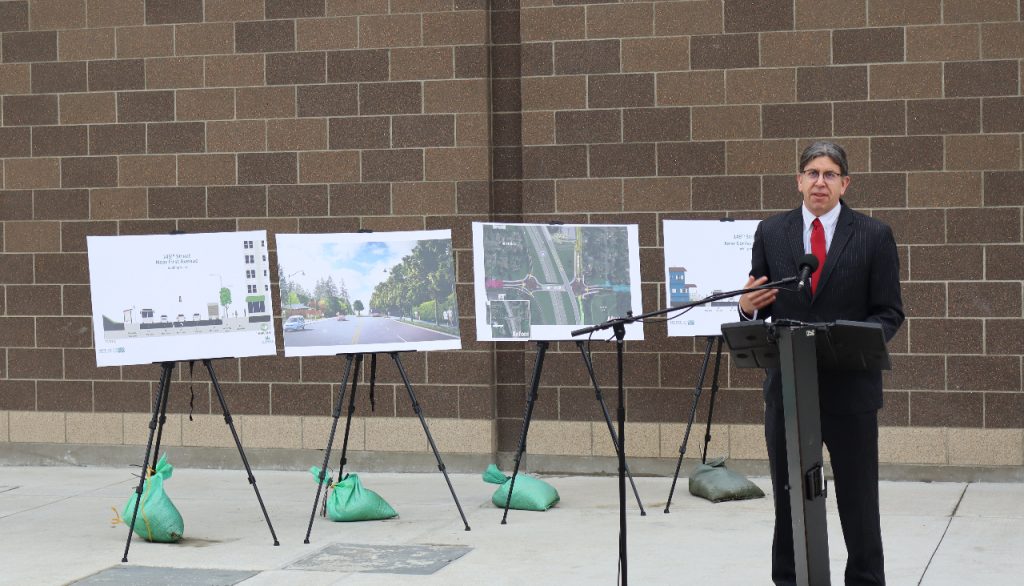
Supporting Shoreline in dropping minimum parking requirements this week was a broad coalition of organizations including the Sierra Club, Habitat for Humanity, SEIU 775, Puget Sound Sage, and Sightline Institute.
“Costly parking quotas are a poison pill for housing affordability,” the coalition wrote. “Mandatory over-paving increases the cost of housing by adding $5,000 to $60,000 per stall, harming buyers and renters. The unnecessary expense often pushes projects into the red, meaning many homes never get built.”
Though the formal vote to repeal mandates won’t happen until sometime in the first half of 2025, giving city staff time to unravel the tangle of references to parking within city code, the majority of councilmembers don’t appear to need any more convincing.
“I really believe that we need to move toward eliminating the minimum parking ratios,” Deputy Mayor Laura Mork said Monday, pushing the council to strike the word “consider” from its motion to fully unequivocal. “I just went to an affordable housing conference — that was the number one thing. We’ve had so many public comments here tonight, I don’t think ‘consider’ is strong enough.”
Even Councilmember Annette Ademasu, one of the more cautious members of the council when it comes to land use, was convinced to join the majority.
“Initially, I preferred a stepped approach, and I had proposed possibly two amendments for tonight, but I decided against it,” Ademasu said. “After a lot of hearing from residents and organizations and just looking at what our goals are for housing affordability, climate, equity and social justice, so I would really strongly like to see brought back in January or within a few months and have that dedicated public input and look at this.”
Shoreline embraces neighborhood cafes
Shoreline is also set to see some of the boldest action in the region when it comes to legalizing neighborhood businesses. Under the plan, Shoreline is set to allow small cafes, restaurants, corner stores, hardware stores, and offices to open in locations where they’re currently not allowed. As laid out in a draft development code update set to be adopted in January, those commercial uses would be allowed on any streets that aren’t dead ends or culs-de-sac, and limited to 1,000 square feet of public-facing retail space in most zones, not including restrooms or hallways.
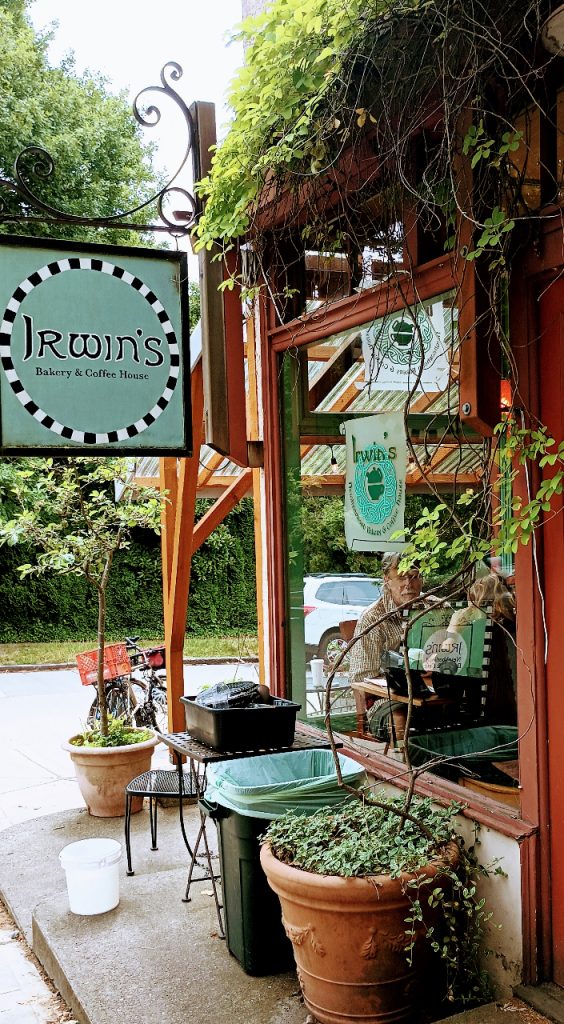
Under a proposal that failed to advance at the Washington State Legislature earlier this year, cities statewide would have had to allow cafes up to 2,000 square feet, including back-of-house space. But Shoreline’s proposal is more broad, and there are amendments on deck that could increase the amount of public-facing space to 1,200 feet and 1,500 along arterial streets. Within the NR2 zones, where fourplexes are set to be allowed, businesses would only be allowed to have a maximum of two off-street parking stalls to encourage walkability.
By contrast, the draft regulations released by the City of Seattle earlier this year would only allow corner stores on literal corner lots, with no parking maximums. Monday night’s unanimous vote illustrates a city that is taking the direction provided both by community input and nudges and requirements handed down by the state legislature and running with it.
“We are in a housing crisis. I believe we need to make sure that people are able to build the housing they want, and there’s enough opportunity for people to find the housing they want in our city,” Roberts said ahead of the vote. “I’ve heard so many people, not only tonight in this chamber, but also on emails and also on social media this past week of how wonderful they think Shoreline is, and we’ve been rewarded. And so why don’t we want people? We should want people to come and live here.”
Ryan Packer has been writing for The Urbanist since 2015, and currently reports full-time as Contributing Editor. Their beats are transportation, land use, public space, traffic safety, and obscure community meetings. Packer has also reported for other regional outlets including BikePortland, Seattle Met, and PubliCola. They live in the Capitol Hill neighborhood of Seattle.

